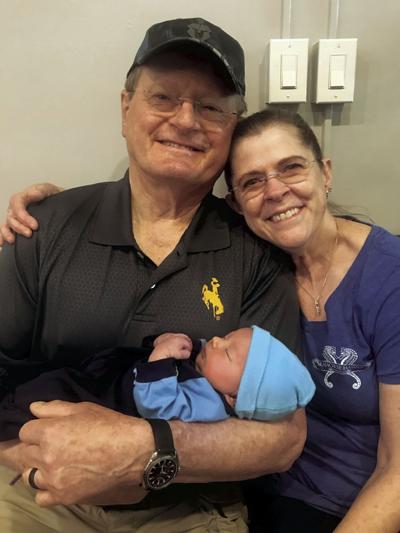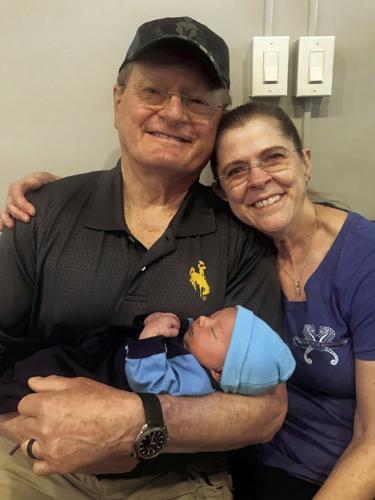Dr. John Thalken will end an era of his 39-year career as a doctor as he (mostly) retires July 6. While giving up the majority of his work, Thalken will continue to see patients at the Douglas Care Center.
“I’m not retiring because I’m angry at somebody or have been mistreated. I’m retiring because I’m old and tired, and I want to be a professional grandpa,” Thalken said, a note of dry humor in his voice.
“A lot of people have told me I would know when it’s time to retire, and with the birth of my twentieth grandkid, it’s time. I’d like to get to know them better. I hope to spend a lot of time going to grandkids’ ball games, plays and concerts.”
While a desire to spend more time with his grandkids has greatly motivated him to retire, Thalken hopes that his continued work at the Douglas Care Center will help to make the mental adjustment to retirement more manageable.
“My work at the nursing home let me ease out a little more. I haven’t done anything else for more than 39 years. Getting into medical school was a big deal, and counting the time to get through all that it’s more like 45 years – that’s most of my life.
“Staying with the nursing home allows me to wind down a little more slowly, but also I don’t want those people to get dropped . . . the actual patient contact is why I decided to do medicine anyway,” he said.
Thalken grew up in Wheatland, graduated from the University of Wyoming with a bachelors in Zoology, then attended the University of New Mexico School of Medicine.
Thalken used a program to help pay for medical school which required that he work for three years in a designated medical care shortage area. As Wheatland happened to be a designated shortage area, he returned home after finishing his residency at the Mayo Clinic in Rochester, Minnesota.
“The Mayo Clinic is a remarkable place, although (it was) pretty overwhelming on my first night on call. St. Mary’s Hospital has 1,100 beds and has been built on, I don’t know how many times – it’s like following cattle trails. GPS didn’t exist in that day, but I could’ve used one.
“Going from the Mayo Clinic to Wheatland, which wasn’t well equipped, was like taking a cold shower. It was a little bit of a cultural shock coming back home; I knew everybody and it was a little bit odd taking care of my teachers and people that I’ve known and respected for a long time,” he said.
Thalken said he worked in Wheatland for 20 years, during which time he operated his own practice.
“I’m a terrible businessman. I had some real issues with that part. Once the business got stretched out, these nice people (at MHCC) offered me a job where I didn’t have to do business – that was huge.
“Once in a while folks’ll bring up something that happened during that period, but I don’t remember at all. I was too tired to remember where I was sometimes.”
Thalken’s notable educational career is significant. Since 2009, Thalken has regularly had third-year medical students shadow him in his practice, and has utilized nontraditional methods to teach his pupils.
“The biggest highlight (of my career) has been dealing with the students. They’re all driven; they all really want to do well. It’s just a breath of fresh air,” Thalken said. “The traditional approach to students is to intimidate and demean them. We all have seen that making rounds in a huge hospital, but I decided that wasn’t very helpful.
“So after the first couple of students, my approach was to let the student go interview the patient, not have me in the room at all. They’d come back and present the patient to me and then tell me what their assessment and plan was. If it sounded good to me, we didn’t change anything. If there was something we needed to add, we talked about what we needed to add, and what we should look into. Through this, the students were actually practicing medicine.”
Over the course of his career, Thalken has received four separate excellence in teaching awards from the The University of Washington School of Medicine’s Washington, Wyoming, Alaska, Montana and Idaho (WWAMI) Regional Medical Education Program, the most recent being the Richard M. Tucker WWAMI Faculty Excellence in Teaching Lifetime Award.
“(The awards are) all student driven, fortunately. I mean, if the administration was doing it, it’d be one thing. The students are the people I care about when I’m trying to teach. The administrators, I assume they already know all this stuff,” he said.
Looking back on his career, Thalken is thankful for the opportunities and experiences he’s had.
“Not everybody in medicine wants to work in a small town. As small towns go though, this place has incredible facilities. Despite the fact there’s a lot of people that are not happy with it right now, I don’t know where I could have practiced and been treated this well, got paid this much and had the services available to me.”







(0) comments
Welcome to the discussion.
Log In
Keep it Clean. Please avoid obscene, vulgar, lewd, racist or sexually-oriented language.
PLEASE TURN OFF YOUR CAPS LOCK.
Don't Threaten. Threats of harming another person will not be tolerated.
Be Truthful. Don't knowingly lie about anyone or anything.
Be Nice. No racism, sexism or any sort of -ism that is degrading to another person.
Be Proactive. Use the 'Report' link on each comment to let us know of abusive posts.
Share with Us. We'd love to hear eyewitness accounts, the history behind an article.